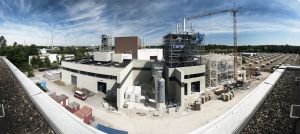Completion of the bioliq® pilot plant on Campus North of Karlsruhe Institute of Technology (KIT) is advancing with large steps. Today, KIT celebrated the topping-out ceremony for the remaining process stages of the plant together with representatives of the Federal Ministry of Food, Agriculture, and Consumer Protection, the State of Baden-Württemberg, and the industry partners involved. The process developed by KIT serves to produce high-quality and engine-compatible designer fuels for diesel and Otto engines from biogenous residues, such as straw. In early 2013, the plant will take up operation.
“Introduction of biofuel is an important step towards the use of renewable resources for mobility,” emphasized KIT Vice President Dr. Peter Fritz during the ceremony. “However, emissions of the greenhouse gas of carbon dioxide (CO2) can only be reduced significantly by biofuels of the second generation.” For this reason, bioliq® is based on straw and other biogenous residues. The advantage: These residues are not used as foodstuff or feedstuff and they do not require any additional cultivation area. Construction of the bioliq® pilot plant will cost about EUR 60 million. The Federal Republic of Germany and the federal state of Baden-Württemberg provide funding in the total amount of about EUR 26 million for construction. Industry partners bear about 20% of the investment costs.
Peter Bleser, Parliamentary State Secretary of the Federal Minister of Food, Agriculture, and Consumer Protection, was highly impressed by the achievements of KIT and its industry partners. “The Federal Government is pinning big hopes in the bioliq® concept developed here. With this process, synthetic biofuels can be produced for diesel and Otto engines. Use in passenger cars, trucks, and ship engines as well as aircraft engines is feasible. These fuels are combusted in a clean manner. High area yields can be made use of and a wide variety of suitable feedstocks, including organic residues, is available. If these potentials can be opened up in practice, BtL fuels can contribute decisively to the reorganization of energy supply,” said Bleser.
The complete bioliq® process consists of four stages. The first stage of the process serves to densify energy, as the dry residual biomass is distributed over wide areas and has a low energy content. At decentralized plants, straw and other biogenous residues are converted into a petroleum-similar intermediate product of coke and oil by flash pyrolysis. This so-called bioliqSynCrude® contains about 90% of the energy stored in the biomass – its energy density is more than ten times as high as that of the feedstock. The pilot plant of this first process stage has already been completed and operated on KIT Campus North since 2009.
The energy-rich intermediate product can be transported in an economically efficient manner over large distances. To produce high-quality and highly pure synthesis fuel, another three process stages are required. The building shell for these stages has now been completed on KIT Campus North.
From bioliqSynCrude® to Designer Fuel
In the next stage, the energy-rich intermediate product is converted into synthesis gas, a chemically reactive mixture of carbon monoxide (CO) and hydrogen (H2). In the course of this process, the bioliqSynCrude® is mixed with oxygen and decomposed into the basic elements of synthesis fuels under pressure and at temperatures above 1000°C. During subsequent hot-gas cleaning, impurities, such as particles, chlorine, and nitrogen compounds are separated from the synthesis gas. At KIT, a new technology will be used. Cleaning will take place at 500°C, as a result of which energy consumption will be reduced compared to conventional processes.
A new approach is also pursued by KIT in the final process stage. The basic elements are combined specifically in tailored designer fuels. Depending on the synthesis path, either diesel or gasoline can be generated. “It is aimed at supplying highly engine-compatible fuel. The constant composition of the products of high quality required is reached by adjusting the synthesis conditions,” says KIT Vice President Dr. Peter Fritz.
Cooperation partners for the different bioliq® process stages are Lurgi GmbH, Frankfurt, MUT Advanced Heating GmbH for gas cleaning, and Chemieanlagenbau Chemnitz GmbH.
Further information on bioliq® can be obtained at http://www.bioliq.de/ .
Karlsruhe Institute of Technology (KIT) is one of Europe’s leading energy research establishments. The KIT Energy Center pools fundamental research with applied research into all relevant energy sources for industry, households, services, and mobility. Holistic assessment of the energy cycle also covers conversion processes and energy efficiency. The KIT Energy Center links competences in engineering and science with know-how in economics, the humanities, and social science as well as law. The activities of the KIT Energy Center are organized in seven topics: Energy conversion, renewable energies, energy storage and distribution, efficient energy use, fusion technology, nuclear power and safety, and energy systems analysis.
In close partnership with society, KIT develops solutions for urgent challenges – from climate change, energy transition and sustainable use of natural resources to artificial intelligence, sovereignty and an aging population. As The University in the Helmholtz Association, KIT unites scientific excellence from insight to application-driven research under one roof – and is thus in a unique position to drive this transformation. As a University of Excellence, KIT offers its more than 10,000 employees and 22,800 students outstanding opportunities to shape a sustainable and resilient future. KIT – Science for Impact.

